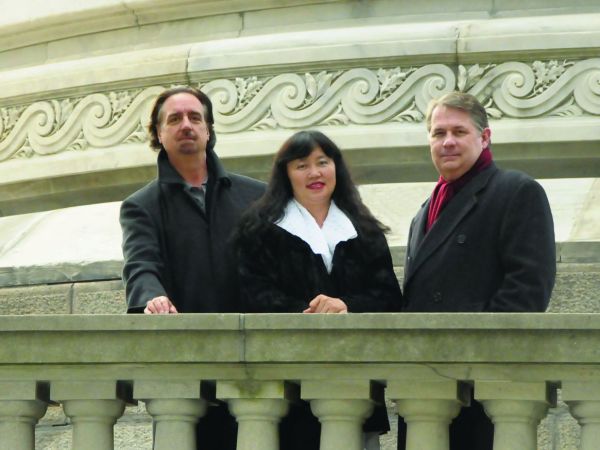Schubert in the spotlight with Wu Han and friends at Wolf Trap

Wu Han was joined by David Finckel, Philip Setzer and others for an all-Schubert program Friday night at The Barns at Wolf Trap.
When it comes to personal meanings in their music, composers generally keep their secrets close. Occasionally, though, sections of a piece’s DNA may be revealed.
Such was the case in the Schubertiade program performed by pianist Wu Han and colleagues Friday night in The Barns at Wolf Trap. It combined two major works of chamber music, in which Schubert drew on song melodies, musical material running through each score like a hidden message.
Schubert heard the short, simple song “Se solen sjunker” (“See, the sun is setting”) by Swedish opera singer Isak Albert Berg at a friend’s house, using it in the slow movement of his Piano Trio No. 2. Bass-baritone Michael Sumuel revealed it as a melancholy miniature in a performance with Han at the keyboard. Sumuel’s voice has developed in subtlety and polish since his apprentice years as a young artist at Wolf Trap in 2010 and 2011, and he negotiated the leaps of a minor 10th upward into the baritone range with grace.
Not much of Berg’s melody actually appears in the Andante movement of Schubert’s Piano Trio No. 2, as this performance by Han, violinist Philip Setzer, and cellist David Finckel showed. The part of the melody that clearly fascinated Schubert was an octave leap downward on the dominant at the midpoint of the song. It turns out that this motif is sung to the word “Farväl” (Farewell), and the word pops out of the trio every time it appears in the piece, which seems significant in a piece written the year Schubert died.
Han presided over this rendition with grace and delicacy, lightening the loud top range of the venue’s Steinway grand piano in the ornamental triplet patterns of the development, for example. Setzer and Finckel, longtime colleagues in the Emerson String Quartet, struggled at times in higher passages, the tone a little pale in spots. Every time that “Farewell” octave-leap motif appeared, the musicians brought it out, including as a bass pedal point in the piano in one variation.
In the Scherzo the staccato passages in the strings were dicey in intonation, perhaps related to a slightly over-fast tempo choice. By contrast the fourth movement, set at the same tempo, had a more lilting feel, the main theme ebullient and happy-go-lucky. All three musicians handled the impish repeated-note motive that brings some anxiety into the piece with elegance, especially difficult when the keyboard takes it up. Schubert returns to the Berg song in this movement, but the fearful “Farewell” is optimistically resolved in the major key.
Sumuel displayed pleasing variety in his voice in a brief set of Schubert songs introducing the second half. The perennial “An die Musik brought out the silky side of his low range and seamless legato, “Schäfers Klagelied” a lovely, compressed soft tone, and “Lied eines Schiffers an die Dioskuren” a stentorian resonance. “Meeres Stille” (“Calm Sea”) was the best of the group, a tour de force of vocal quiet and stillness. Han proved herself a consummate accompanist, especially in the slithering scales of “Die Forelle,” quoted in the last work of the concert.
Violist Paul Neubauer and double-bassist Joseph H. Conyers joined the group for the Piano Quintet in A major (“Trout”), and both made strong contributions. Schubert used the double-bass to expand the sonority of the piece, and Conyers, assistant principal player in the Philadelphia Orchestra, responded with precision and strength of tone. Han’s brilliant work at the keyboard lifted the first movement, while Neubauer’s plangent solos were a high point of the second movement, the first of the piece’s two slow movements.
The staccato passages of the Scherzo’s main section proved tenuous for the upper strings at times, but the contrasting middle section was a highlight in terms of ensemble unity. Schubert quotes his song melody quite directly in the fourth movement, with each instrument having its turn at it, and then incorporates elements of the accompaniment in the fifth movement, again given fluid transparency by the versatile Wu Han at the piano. As in the song, the fish did not get away.
The Montrose Trio will perform piano trios by Haydn, Brahms, and Dvořák 7:30 p.m. March 8 in the Barns at Wolf Trap. wolftrap.org; 703-255-1900
